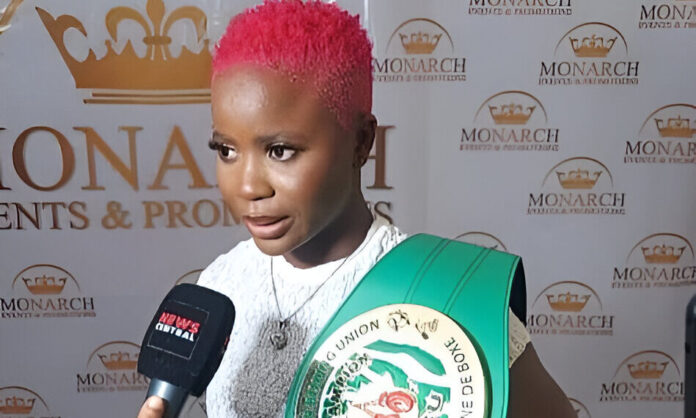A devastating right hand from Adijat Gbadamosi sent Patience Mastara’s gum shield flying. Adijat landed another vicious jab to her opponent’s chest, which saw the referee stop the bout, adding another chapter to the fairytale story of Adijat Gbadamosi, the Osun State-born boxer.
The pugilist, hard as nails and with a strong right jab, had been honing her feints and punches that have led her to fame from a young age on the streets of Lagos.
Mastara was not ready to cave in as some section of the Ghanaian crowd cheered on the Zimbabwean in the bout held in June. However, it was not just admiration for the fighters’ skill that drew the crowd; many of the spectators may have taken bets in a country where gambling is legal.
With the Nigeria-Ghana Jollof Rice war in the picture, Gbadamosi was much more determined to become Nigeria’s first female professional boxer to win a major title outside the country.
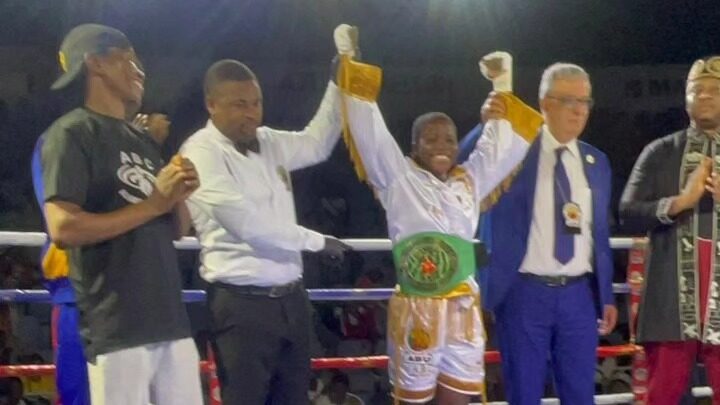
Dressed in white and gold shorts, Gbadamosi landed powerful punches with both hands on her opponent’s face, shoulders, and abdomen until the decisive blow in the fifth round left Mastara down and ultimately decided the fight.
Since that bout, many ringside observers have questioned whether we can take either boxer seriously due to their unusual backgrounds, but Nigerian officials have presented Adijat’s bantamweight success story as evidence of the country’s growing influence in female boxing.
“It was such a great moment when I won the bout and entered the history books as the first female Nigerian boxer to win an ABU title,” Adijat said, beaming with smiles as some sections of the crowd went home mulling and her team took off her bandages and applied petroleum jelly to a cut above her eyebrow. Aside from the cut and some swelling, Gbadamosi had proved again why Nigeria is a force to be reckoned with, not just in football but in female boxing.
‘What a man can do, a woman can do better’
In sports in Nigeria, the popular adage “what a man can do, a woman can do better” finds profound resonance. It is undeniable because Nigerian women have recorded more success in sports than men in recent years. They have won more medals at major international competitions, such as the Olympics, World Athletics Championships, and Commonwealth Games.
In football, for example, while the Super Eagles have won the AFCON three times, the Super Falcons have won the AWCON nine times. This narrative rings true in wrestling, basketball, and even weightlifting, where women have enjoyed more success than their male counterparts.
Women boxers have also begun to make inroads into a male-dominated sport to secure qualification for major competitions, win titles, and make the country proud. Boxing has long been associated with masculinity, but lately, the rising profile of female boxing is challenging these stereotypes. And more and more, we are seeing that the future is feminine.
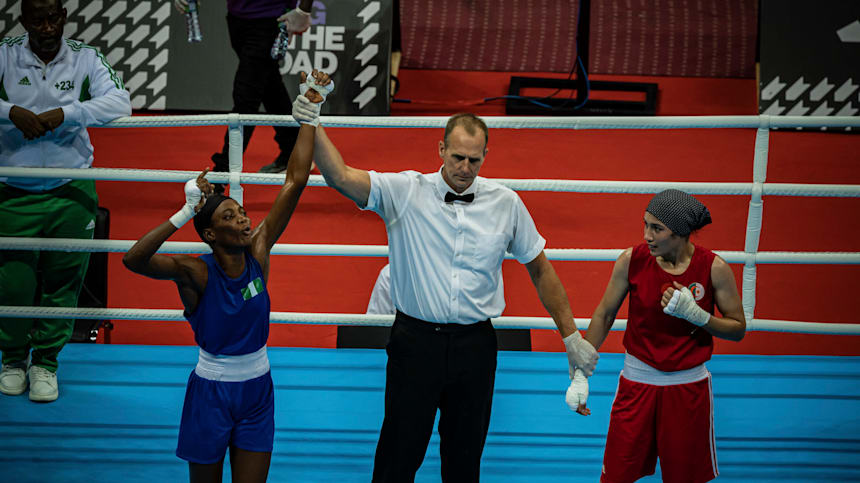
Cynthia Ogunsemilore’s recent success as the second Nigerian woman to qualify for the Olympics and Adijat Gbadamosi’s achievement as the first female Nigerian boxer to claim an African title highlights major milestones. It has been a long time coming for the country’s female boxers.
From the duo of Millicent Agboegbulem and Yetunde Odunuga, who are 2008 Commonwealth medallists, to Edith Ogoke, the first Nigerian female boxer to compete at the Olympic Games in 2012, the potential of Nigeria’s female boxers has never been in doubt.
Rough road
Predictably, however, it has never been a straightforward journey for the ladies now on top of their game or even for those coming behind them.
For Ogunsemilore, hailing from Bariga, a tough neighbourhood in Lagos State, a known hotspot for street fights and gang conflicts, most of her life has been a fight to survive and thrive. Growing up in this waterside ghetto has taken a toll on many kids, but it has been a training ground for Ogunsemilore, who honed her punching skills on these same streets.
“I am from Bariga, and boxers from there [believe] that they don’t have futures; they can only become like touts. Since I started boxing, everything has been hard for me. But as a Bariga girl, I am rugged. I won’t quit,” she told Olympics.com.
She continued: “It’s not easy being a female boxer in Bariga. The men would tell me, “You are supposed to get married, but you are here training. You should go have a baby or find some serious work.”
“So many blamed my father for putting me in boxing. I often said, ‘What a man can do, a woman can do better’.”
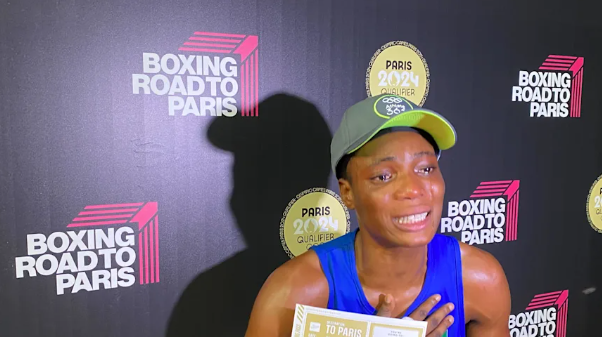
Now, Ogunsemilore hopes her success in pursuit of Olympic glory can inspire hundreds of female boxers in Nigeria and across Africa.
“I know girls watching and following me – following us female boxers can motivate them to put in more effort. Keep training, keep working, and with time, everything will be fine.”
Adijat told that she had almost thrown in the towel due to the challenges she faced.
“Sometimes, when I feel like quitting, I go home and cry. My brother kept encouraging me because, at some point, I wanted to just give up. He will tell me that I have gone too far to give up now, that the years I have put in will now be a waste of my time.
“I didn’t learn any trade or any other thing. I am just focused on boxing, so I have to focus and make it work. I got signed by Monarch Promotions, and it is a privilege for me. I’m very happy,” Gbadamosi said a few days after her historic feat earlier this year.
More converts
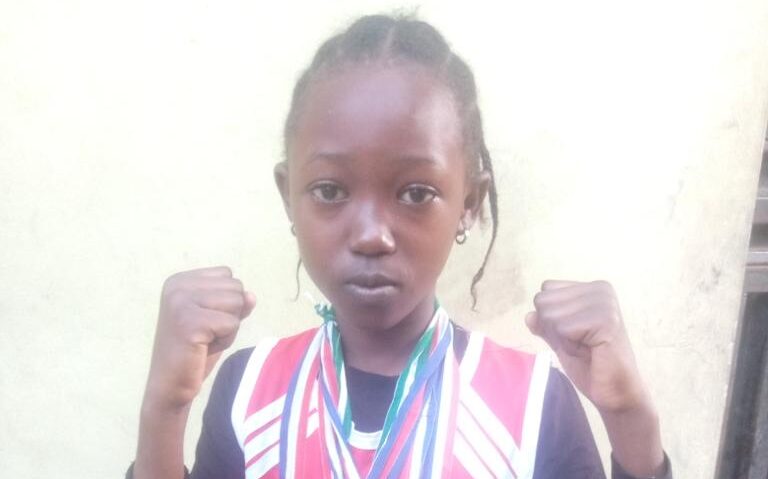
Aside from the relatively established stars, more young girls are also getting into the ring as they hope to chart a course for their futures. One of them is Habibat Olore, the 11-year-old daughter of one of Lagos State’s prominent boxing coaches.
Speaking to PREMIUM TIMES about his daughter’s foray into boxing, Coach Olore said it was the choice of the little girl and not his own, as many often suggest.
“It is a fact that female boxing is growing compared to before. In Lagos State and even here in Alimosho, we have many females that have taken to boxing, including my 11-year-old daughter.”
“She had the interest by herself. When I was training her elder brothers, she just called me ‘daddy, can you be training me too?’ Now she has been boxing for five years. She has been in so many competitions and trials.
Asked how he feels first as a father and as a coach watching his 11-year-old daughter in the ring, Coach Olore says there is no extraordinary feeling for him.
“As I have said before, this is my work and what I believe in. My daughter has been into boxing since she was six years old, and she has learned a lot; like dodging punches and all that, so I feel the same way I feel with all my other boxers.”
For Coach Olore, whose daughter is a big fan of Anthony Joshua and Floyd Mayweather, seeing his daughter turn into a full professional will be a dream come true.
“My wish is for her (Habibat) to be a professional boxer. If she can, it will be great, Every time we are together, she always tells me she wants to be like Anthony Joshua and Floyd Mayweather, she usually asks me if I can help her as she wants to go to America and London to fight and I promise her that as much as I am alive, I will try my best for her.”
Another budding talent hoping to box her way to stardom is Ifeoluwa Oseni. Oseni’s coach, Ifeanyi Nwinwu, spoke with PREMIUM TIMES about why more attention needs to be paid to female boxing, especially as it is becoming a veritable career for young girls.
“Ifeoluwa Oseni is very good. She is even studying at UNILAG and is in year two presently. She came into boxing out of her own volition. She heard about me and came over so I could put her through,” Nwinwu started.
While Coach Nwinwu is hopeful Oseni can hit the heights at the next National Sports Festival in Ogun State, he revealed he is shouldering her needs at the moment.
“I use my money to buy everything she has been using for training to encourage her because, along the line, it appears she was getting discouraged.”
Punching positives
The growth of female boxing in Nigeria is having several positive effects. For one, it is providing girls and women with an opportunity to develop their physical and mental strength. It is also gradually becoming an avenue to escape from the shackles of poverty.
Boxing is a challenging sport that requires discipline, hard work, and determination. Some female boxers who take part in the sport told PREMIUM TIMES they often see a significant improvement in their self-confidence and self-esteem.
Challenges facing female boxing in Nigeria
Despite the growth of female boxing in Nigeria, there are still some challenges that female boxers face. One of the biggest challenges is a lack of funding. Female boxers often have difficulty securing sponsorships and other forms of financial support. This can make it difficult for them to train and compete at the highest level.
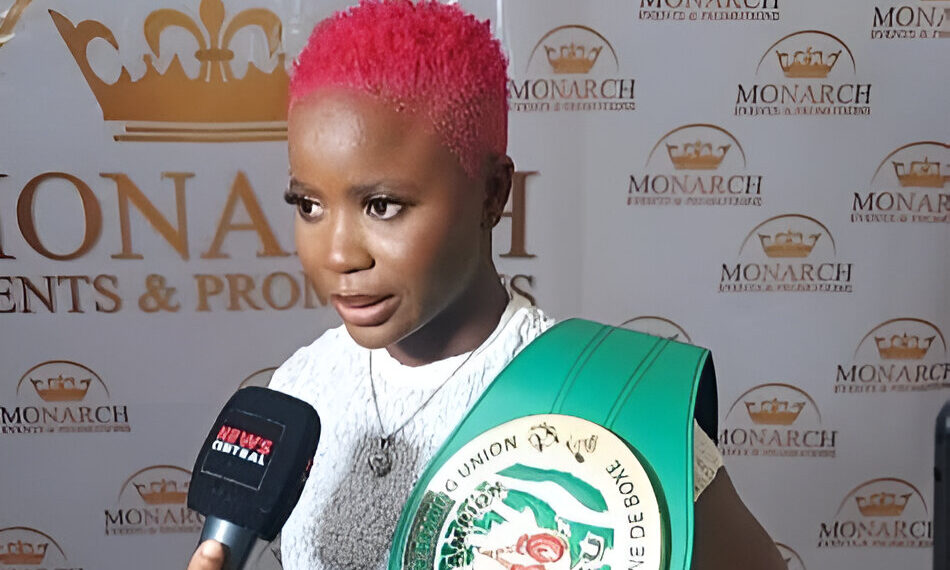
Adijat Gbadamosi at a meet-the-press event after winning the African title
Another challenge facing female boxing in Nigeria is a lack of media coverage. The media rarely covers female boxing and most times, we cannot view their matches. This lack of media coverage makes it difficult for female boxers to gain exposure and build a following.
Finally, female boxers in Nigeria also face some social challenges. In some parts of the country, there is still a stigma associated with women taking part in boxing. This has made it difficult for female boxers to find training partners and compete in matches.
Gbadamosi’s fairy-tale story in Accra may have set the tone for female boxing growth in Nigeria, and one fact is that in the coming months, many more will adorn the headgear and put on their gloves to come out fighting.
It will be better to create an avenue where their punches land on real opponents.
Courtesy: Premium Times

















